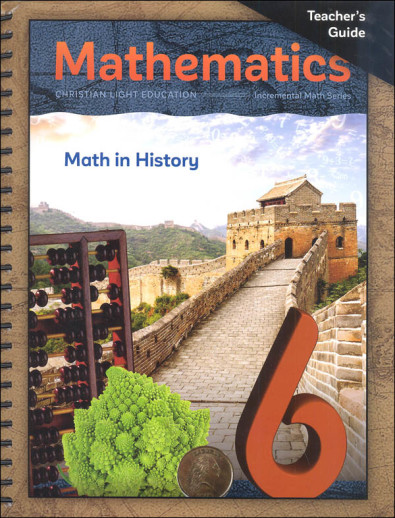We use cookies to make your experience better. To comply with the new e-Privacy directive, we need to ask for your consent to set the cookies. Learn more.
Mathematics Grade 6 Teacher's Guide (for Textbook)
The Teacher's Guide is full-color, and includes reproductions of all textbook pages with answers.
Math is foundational in so many areas of study and life, and Christian Light Education Mathematics helps lay that solid foundation. Packed with practice and review, Christian Light employs an incremental spiral approach in a workbook format. Each lesson incorporates a new concept and is followed by review of previously learned concepts. Written from a Christian worldview, every lesson reinforces Biblical values. The math courses in this series from grades 1-9 are the Sunrise edition of the series. The Sunrise Edition divides Light Units into daily lessons; two quizzes provide opportunity for application of skills learned; and formatting is clear and more appealing. Each level is one year of math at grade level and those implementing the program will need one set of 10 Light Units per student and a Teacher Guide(s) or answer key. At grades 1 and 2 the teacher guides are required and teacher guides are strongly recommended for grades 3 and 4. Each Light Unit contains student exercises and a test. The first Light Unit in grades 2-8 is a review of the previous grade. The Teacher Guides for grades 1-8 include teacher tips and student pages with answers and solutions. If you don't think you need the Teacher Guide, but want the answers at a quick glance, answer keys are available.
To help ensure students learn their math facts, daily speed drills, oral exercises, and flash-cards are tools used for students in grades 1-4. Basic algebraic and geometric concepts are introduced early, along with money, problem solving, mental math, and number patterns to help students become proficient in these skills. A few supplemental materials are needed for the lower grades Grade 1 uses addition and subtraction flash cards (#72144); My Counting Book (#72357); Counting Chart (#72173); and optional My Calendar Book (#21786); and student clock (#15339 or #60101); Grade 2 uses addition and subtraction flash cards (#72144); Counting Chart (#72173); and optional multiplication/division flash cards (#72356); My Calendar Book (#21786); student clock (#15339 or #60101); and math reference chart (#68518); Grade 3 uses optional flash cards as in 1st and 2nd grades, and the math reference chart. Grades 4-7 and soon to be 8 (later in 2024) offer the option of using the Light Unit approach or text book approach same content but a choice of consumable or non-consumable.
If you choose the Light Units path, parents need only to purchase the Light Units and Teacher Guides or answer keys. If choosing the textbook path, then you will need the textbook (non-consumable), student pack (consumable), Teacher Guide and/or Full Solutions Answer Key. Textbooks are colorful with illustrations and pictures, and provide opportunity for students to do their work on a separate sheet of paper. The Student Pack includes quizzes, tests, and daily speed/mastery drills (math facts review) and measurement equivalents. Full Solutions Answer Key shows each problem of the textbook, quizzes, and tests with step-by-step solutions. Teacher Guides for the textbook are also in full color and include student pages with answers and a cd of printables posters, charts, and practice sheets.
The addition/subtraction flash cards accompanying this curriculum for grades 1-4 are numbered and tabbed to correspond to the teacher guides at those grade levels. Cards measure 3.5" x 7.5", addition/subtraction go from 0 to 18. Multiplication/division flash cards measure 3.5" x 5" and cover math facts from 0-12. The multiplication fact is on the front of the card with the opposite division fact on the reverse. These aren't numbered and tabbed like the addition/subtraction cards. Math Reference Charts are available for grades 2-6, 5-8, and 7/8. These are 8.5" x 11" laminated sheets for easy reference at a glance for those items that students need to remember but need a little help measurement tables, formulas, etc.
Grade 8 is considered pre-algebra and prepares students for any algebra 1 course. It introduces students to concepts needed at the higher levels of math such as Pythagorean theorem, irrational square roots, and basic trigonometry.
The Christian Light Math sequence for high school is Algebra 1, Geometry, Algebra II, and Functions and Trigonometry. To use Algebra I you will need the 10 Light Units (students write on their own paper), solution key (solutions to the Light Units exercises), tests & quizzes, and the test & quiz answer key. These are all sold separately for the Algebra I level. Geometry, Algebra II, and Functions and Trigonometry, each use 10 Light Units and 5 answer keys. Finishing through Functions and Trigonometry will prepare students for college level math.
Consumer Math is an optional math course offered in this series. Equivalent to one high school credit, this course applies math to everyday situations. There are 10 Light Units and 5 answer keys needed to complete the course and they cover basic and everyday math fractions, decimals, percent, family finances, construction & building trades, service occupations, transportation, business services, and occupational diagrams. ~ Donna
| Product Format: | Hardcover |
|---|---|
| Grade: | 5 |
| Brand: | Christian Light |
| Length in Inches: | 10.5 |
| Width in Inches: | 9.5 |
| Height in Inches: | 1.75 |
| Weight in Pounds: | 3.45 |
Be the first to review this item

